Posts Tagged ‘World Relief Triad’
Growing with Gratitude
A word of reflection by Executive Director of World Relief Triad, Rob Cassell.
As we begin 2022, two main themes have been constant for the past few months going into the new year. They are gratitude and growth.
Gratitude
Both World Relief and our clients have felt incredibly loved by our community. As we welcomed Afghan families with a much-reduced timeline to prepare for their arrival, the community sprang into action. They arrived amid challenges regarding document, support delays, and housing difficulties. Good Neighbor Teams were quickly formed to welcome them and provide support, even as Congress lagged in this area. They helped ensured that these families would have their best chance to re-establish themselves here in the Triad. Others gave large one-time gifts solely dedicated to this population. Church members all the way from Boone, NC, began to contact us to see in what ways they could help become a community of welcome.
As we face the reestablishment of Winston-Salem as an official resettlement site and a ten-fold increase in arrivals, our community has already formed 10 Good Neighbor Teams to welcome them, along with several other groups forming Home Setup Teams to make sure that our newest neighbor’s homes are furnished and decorated to welcome our families.
We have also seen the business community of the Triad partner with us at unprecedented levels – both reaching out to partner with us in employing our clients and becoming what is known as a “Business of Welcome.” Businesses of Welcome partner with World Relief financially to create a community where all can thrive.
Growth
The theme of this year could easily be described as having a lot of growth as well: both growth in size and growth in service. We have many positions open to accommodate the increased number of clients we are seeing, with a lot of time and energy into training and empowering new staff to serve our community. Because of this growth, we are excited about providing more profound and more holistic service to our clients.
Some highlights to look forward to this year:
- The expansion of our Youth Mentoring program to Winston-Salem.
- A greater development of our Community Garden to include more agricultural and nutritional educational opportunities
- An increased focus and development of the Guilford Minor Trafficking Response Team – bringing together multiple community partners to combat the trafficking of minors as well as the new staff and capacity to serve the immigration legal services needs of the area.
We are excited by this growth and appreciate your partnership as we make the Triad a welcoming community together.
Grace and peace,
Rob Cassell
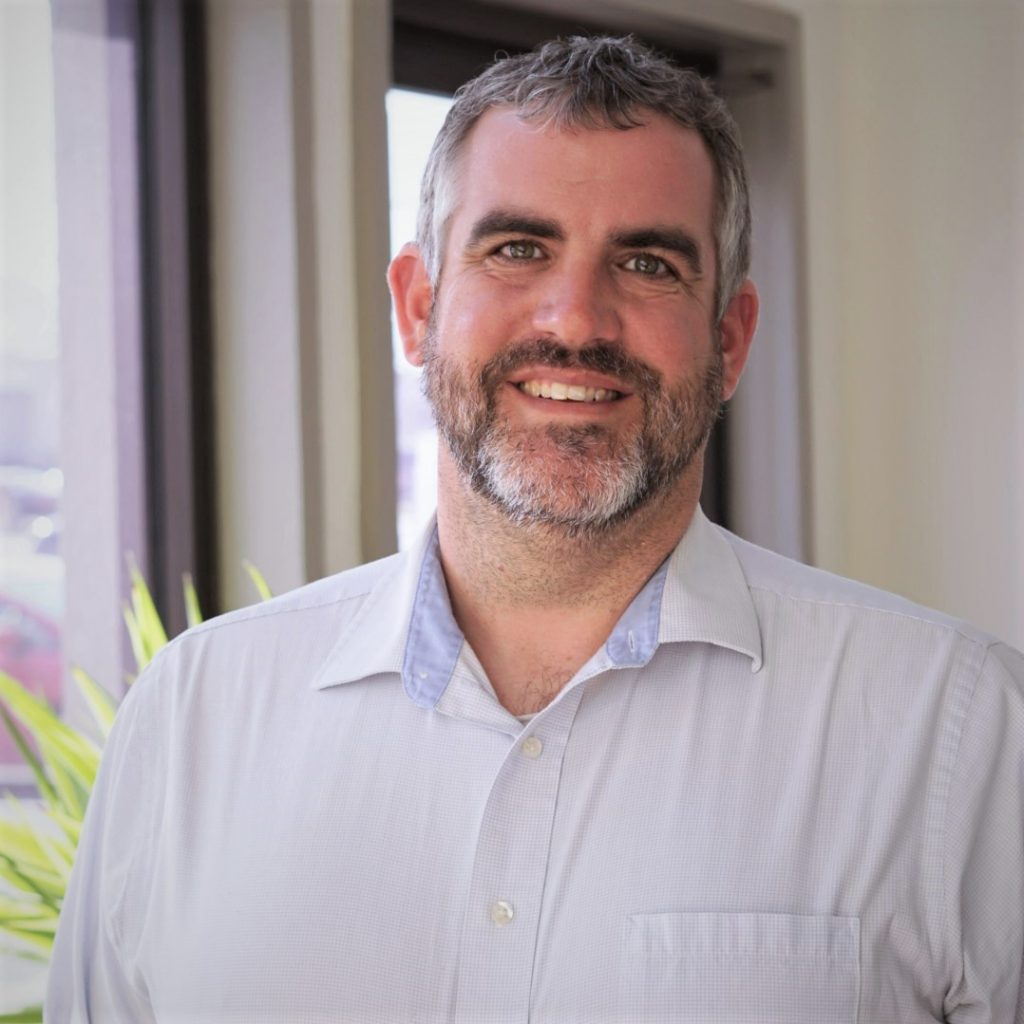
Celebrating our Employee of the Year for 2021, Kara Hernandez
Read below to learn more about Kara’s journey to World Relief, and how she continues to bless our staff, clients, and community!
As we look forward to welcoming more immigrant, refugee, and survivor neighbors in this new year, we still take time to reflect on the hard work of our team from the previous one. That’s why we want to celebrate our employee of the year for 2021, Kara Hernandez!
Kara has worked at World Relief Triad for a little over eight years. Previously, she previously worked as an Employment Specialist and Opportunity Services Manager. Currently, she serves our team as the Program Services Director.
As the Program Services Director, Kara oversees the managers of the Health & Wellness Department, Opportunity Services Department, Anti-Human Trafficking Department. She also directly oversees the refugee client coordinators who serve newly arrived refugee clients.
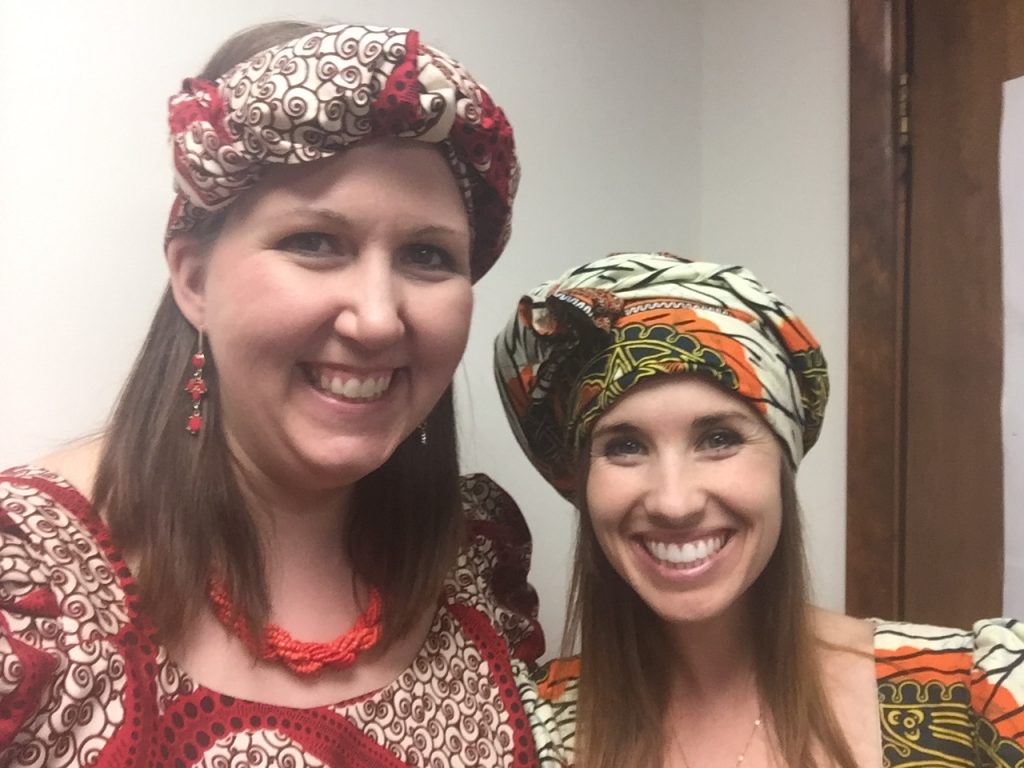
What Our Staff Has to Say about Kara:
“Kara is consistently leading by example, whether that be jumping in and helping with clients, training with the focus on excellence, or showing her caring heart for both our clients and other staff members,” one staff member says. It also said that she, “carried a tremendous amount of weight on her shoulders this (previous) year, and she continues to have a positive but realistic outlook on how to best move forward.”
Other coworkers note that Kara works incredibly hard and faces challenges with “strength and perseverance;” she has “yet to falter, stayed strong, and been a rock for the office.” Others say she is the most empathetic person on the staff and is invested in “every individual’s growth and development.”
Perhaps most importantly, Kara is an ambassador for World Relief.
“She is committed to our mission of integrating the Church into our work and serving clients well. She deserves recognition for her tenacity, loyalty to her staff team, and commitment to our WR mission.”
Being Led to World Relief Triad
“I graduated from North Central University, in Minneapolis, MN, with a Bachelors degree in Intercultural Studies,” Kara says about her journey to the Triad office. “I always wanted to serve people from other countries and felt this calling on my life. At one point, I thought I would be a missionary, but I didn’t know exactly how to achieve that goal.”
Now, Kara sees how God brought it all together to meet her passion for working with international people groups while still using many of her other giftings. Not only did she find a job, but she also found a new life and a community.
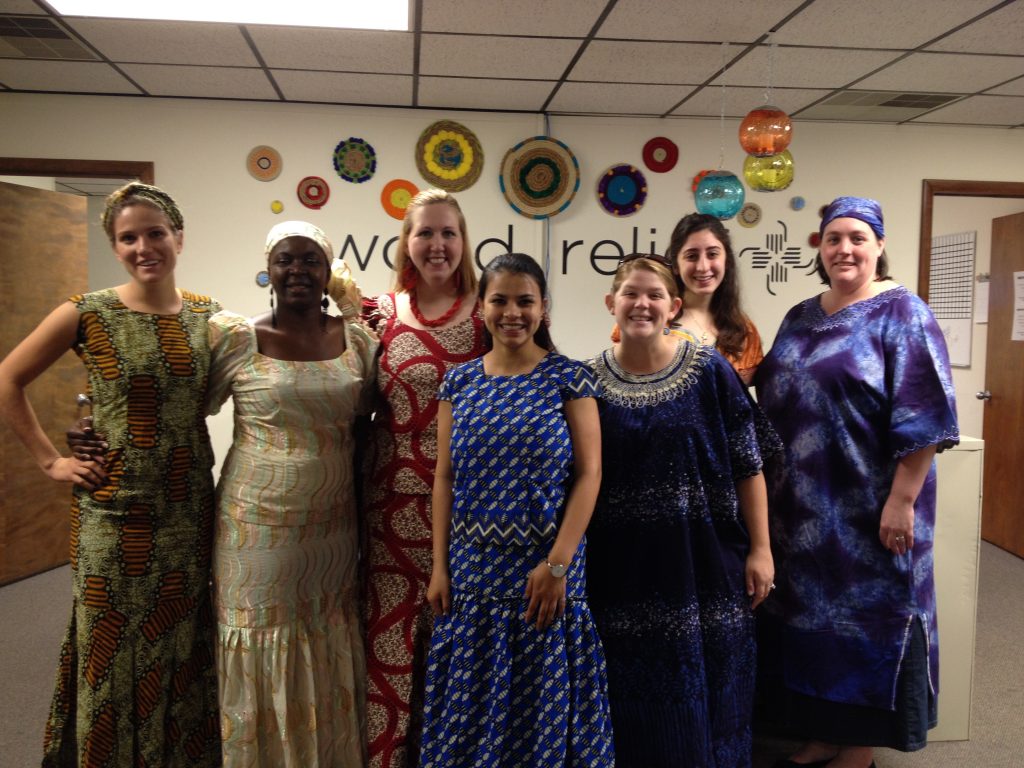
“Being a transplant to North Carolina from the Midwest, World Relief has also given me a community,” she says. “What I love most about my position is the people I get to work with, whether that is our clients, my co-workers, or the Church. Seeing the impact that our services have on the people we serve and their family is very fulfilling.”
Life After Knowing the Refugee Community
With eight years’ worth of experiences, Kara reflects on all the lives God’s allowed her to meet. “I have watched families have babies, people get married, families be reunified, and friendships with volunteers flourish. When I am in the community, I consistently see previous clients. It is always fun to talk for a few minutes and catch up on what is new in their life.”
Kara finally notes how the mission of World Relief relates to her personally, noting how it fuels her to continue in her work. “I believe in what the Bible mandates us to do in Psalms 82:3, ‘Defend the weak and the fatherless; uphold the cause of the poor and the oppressed.’ This is what the Church is called to do. At World Relief Triad, we are able to empower the Church to serve the most vulnerable.”
Congratulations to you, Kara Hernandez! We stand taller and more encouraged because of you. We look forward to seeing how you will continue to serve our office, clients, and the greater community.
Refugee family settles in Winston-Salem after long journey from Afghanistan.
World Relief Triad works to integrate refugees and immigrants, like Ali, in their transition to the United States. But this is not the client’s first time being displaced. The first time, he said, was when he was about 10 years-old. His family and others fled their village to the mountains of Afghanistan.
“They displaced us from our area,” Rahmani, who speaks limited English, said. “We went to the mountains, and it was cold outside. We had to go to the mountains in order to be secure, in order not to be killed. We were hungry and thirsty.”
Ali goes on to share about his family’s journey from the airport in Kabul to Abu Dhabi, Philadelphia, PA, Virginia, and finally landing in North Carolina. Worry still grips him when he thinks about his family who has been left back in Afghanistan, however. The client went on to discuss the horrific outcome of what could await his family, and himself as a displaced person without a permanent path to citizenship.
“The Afghans that are arriving mostly are coming in with what is called a humanitarian parole status,” Rob Cassell, Executive Office Director, says.
This is a temporary status that is good for two years.
“There is no guaranteed path to permanent residency for these Afghans right now,” Cassell says. “They have to apply through the asylum process at this point.”
To read more of Ali’s story and learn about the current situation in Afghanistan, click the following link.
God tells us to welcome the stranger. It’s time to give immigrants a path to citizenship
Now a pastor in Boone, North Carolina, Aitken is grateful for his opportunity to become a permanent resident of the U.S. now. However, he recognizes that this is not the case for many immigrants. “In depriving many immigrants of clear pathways to citizenship, we rob immigrants of a chance to belong, and we prevent their communities from experiencing the transformative power of strangers becoming friends.”
The pastor also spoke on the need for this issue to be resolved and met with a Biblical motivation; that should and can involve “both Democratic and Republican U.S. senators and representatives.” Quoting Ephesians 2:19, Aitken also speaks into the Biblical implications of the importance of home and belonging.
To read more of Aitken’s passionate stance on immigration, and the call he believes Evangelical Christians have concerning the matter, see the following article linked.
Resettled: One Woman’s Journey Beyond Rebuilding
As the number of refugees arriving in the U.S. continues to increase in the coming months, we invite you to partner with us as we welcome them. Today, we’re excited to give you a glimpse at the lasting change that can happen when we move together.
A Crossing of Paths
At World Relief, we’re honored to walk alongside refugees and immigrants from around the world as they rebuild their lives in the U.S. Sharing their stories with you is a privilege. Often though, the stories we share are limited to a short and intense part of people’s lives.
Years later, you may wonder along with us, “How is that family doing now?” I never expected to get an answer to this question when I moved from North Carolina, where I worked at World Relief Triad, to Utah. But that’s exactly what happened.
Two weeks after moving, I bought a plant on Facebook marketplace from a woman named Buthainah. It didn’t take long for us to realize our shared connection: she had been resettled by World Relief Triad in 2009. Hearing her story reminded me of the lasting impact we can have when we move together. Buthainah eagerly agreed to share her story with us today.
When Everything Changes
Buthainah grew up in Baghdad, Iraq. Although the country was tightly controlled by Sadam Husain’s regime, she remembers having a happy childhood.
Her father worked as a major general at the naval academy, and her mother was an architect. Buthainah did well in school. She was a child of imagination — drawing, reading and writing stories in which she was the heroine. “Life was simple for us kids and family,” she said, “we were happy and content!”
But then war broke out, and everything changed. At 13, Buthainah fled with her parents and four sisters to Jordan. Two and a half years later, they were selected for resettlement in the U.S.
Flying to the U.S. was stressful. As a family of seven, they struggled through the airport with two suitcases each. Buthainah remembers bringing clothes, drawings and a memory book from elementary school with notes from her friends and teachers. “I’m a very sentimental person. [They’re] silly things, but they hold a lot of value for me.”
Buthainah’s family arrived on June 25, 2009. From geography to environment to culture, Buthainah was immersed in a world of difference. And a world where she, herself, was labeled as different.
“You have your life, and all of a sudden, it’s taken away from you,” she said. “And then you are labeled as a refugee, not who you are. It makes you feel unseen and it diminishes your value… or at least it did for me.”
Someone to Walk With
But someone did see Buthainah and her family — former World Relief Case Manager, Brian Boggs. “Brian was one of the very few people early on to really understand us,” Buthainah remembers. “He spent time to explain the system to us.”
Brian drove the family to appointments and made sure the kids were enrolled in school. He helped them navigate their new home, finding grocery stores and bus routes.
“[Case management is] basically like helping somebody start their life over in a new place,” Brian explained. “If you think about all the basics people just take for granted — children going to school, parents, if they need it, getting English classes — you’re trying to guide people in a way that will help them be successful later on.”
In the midst of hectic transitions and changes, Buthainah remembers that Brian was there for her family when they needed him most. “He was a stranger to us, [but he] made it easier to feel people cared and saw us for who we were, not just another number or another person who is going to be a burden.”
Life After Resettlement
With Brian’s help, Buthainah’s family adjusted to their new lives in America. The girls settled in at school and their parents found work. Their lives were being rebuilt. Eventually, Brian became busy caring for more recent arrivals, and Buthainah and her family transitioned out of World Relief programs, pursuing new dreams of their own.
Buthaina’s parents both went back to school for master’s degrees and then PhDs in computational science. Her mom is now working as an energy analyst and her dad is retired.
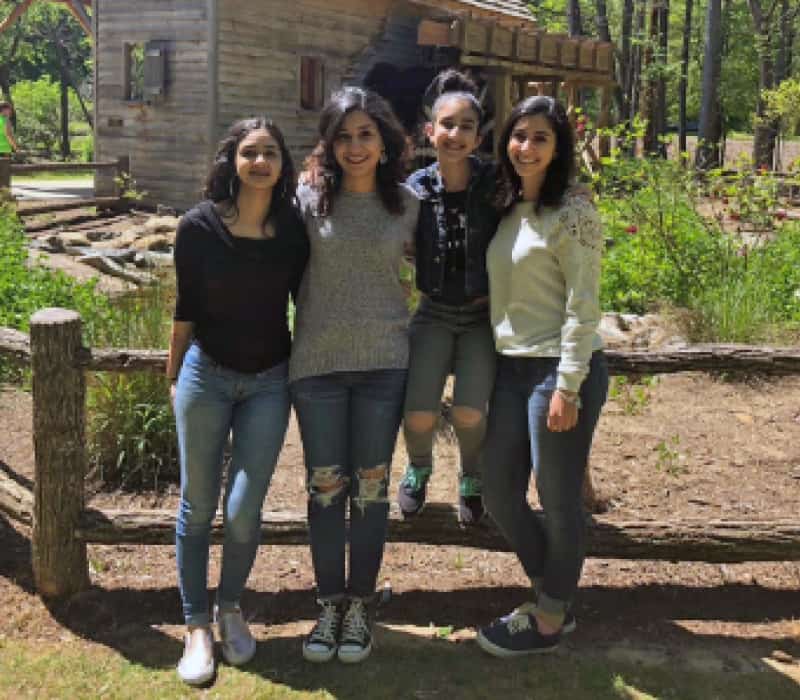
One sister is completing her residency in Delaware. Another is working as a paralegal and plans to go to law school. The third is in college, and the youngest, who was only five when they were resettled in the Triad, is hoping to finish high school in just three years.
As for Buthainah, she graduated high school with excellent grades, went to college, and worked as a process chemist at a pharmaceutical company. She then decided to attend graduate school in Utah.
Today, she’s moved back to Greensboro to be closer to family and has successfully completed a PhD in organometallic chemistry. She’s now dreaming of starting her own business and maybe even a reform movement.
“Like reform of education and reform of the way we think,’ Buthainah said. She wants to help people understand the many ways we can learn and approach life. “Exactly how I’m going to get there?” she laughed, “I don’t know — but I have faith that it will all work out.”
When We Move Together
Twelve years later, Buthainah’s had time to think about her experience of resettlement. When asked what she would say to her younger self, she said, “Just know who you are. Be true to who you are, and don’t be ashamed of where you come from.”
She also had some advice for those welcoming refugees now. “You have a choice to judge another human being and make them less than you or not,” she said. “We’re very thankful to the people who really gave us a chance and gave us a start.” People like Brian.
When Buthainah and Brian recently reconnected, she told him, “You made us feel seen and you made us feel like we’re humans and we have equal chance. Because of that, we were able to believe in ourselves. It just takes some people sometimes to have that faith in you at your lowest when you doubt yourself.”
But Brian is reluctant to take credit.
“When you know people who are going through some of the hardest things not only that they’ve been through, but maybe all of humanity could go through,” he said, “you see potential. I don’t take credit for any of it… [Buthainah’s family] worked hard and believed in themselves. It’s theirs. It’s really nice to be invited into their journey.”
We are so grateful to partner with families like Buthainah’s. As the number of refugees arriving in the U.S. continues to increase over the next few months, it will take all of us to build communities of welcome. So, move with us and we’ll welcome them together.

Kelly Hill serves as a Content Writer at World Relief. She previously served as Volunteer Services Manager at World Relief Triad in North Carolina before moving to Salt Lake City. With a background in International and Intercultural Communication, she is passionate about the power of story to connect people of diverse experiences.
Resettled: One Woman’s Journey Beyond Rebuilding
As the number of refugees arriving in the U.S. continues to increase in the coming months, we invite you to partner with us as we welcome them. Today, we’re excited to give you a glimpse at the lasting change that can happen when we move together.
A Crossing of Paths
At World Relief, we’re honored to walk alongside refugees and immigrants from around the world as they rebuild their lives in the U.S. Sharing their stories with you is a privilege. Often though, the stories we share are limited to a short and intense part of people’s lives.
Years later, you may wonder along with us, “How is that family doing now?” I never expected to get an answer to this question when I moved from North Carolina, where I worked at World Relief Triad, to Utah. But that’s exactly what happened.
Two weeks after moving, I bought a plant on Facebook marketplace from a woman named Buthainah. It didn’t take long for us to realize our shared connection: she had been resettled by World Relief Triad in 2009. Hearing her story reminded me of the lasting impact we can have when we move together. Buthainah eagerly agreed to share her story with us today.
When Everything Changes
Buthainah grew up in Baghdad, Iraq. Although the country was tightly controlled by Sadam Husain’s regime, she remembers having a happy childhood.
Her father worked as a major general at the naval academy, and her mother was an architect. Buthainah did well in school. She was a child of imagination — drawing, reading and writing stories in which she was the heroine. “Life was simple for us kids and family,” she said, “we were happy and content!”
But then war broke out, and everything changed. At 13, Buthainah fled with her parents and four sisters to Jordan. Two and a half years later, they were selected for resettlement in the U.S.
Flying to the U.S. was stressful. As a family of seven, they struggled through the airport with two suitcases each. Buthainah remembers bringing clothes, drawings and a memory book from elementary school with notes from her friends and teachers. “I’m a very sentimental person. [They’re] silly things, but they hold a lot of value for me.”
Buthainah’s family arrived on June 25, 2009. From geography to environment to culture, Buthainah was immersed in a world of difference. And a world where she, herself, was labeled as different.
“You have your life, and all of a sudden, it’s taken away from you,” she said. “And then you are labeled as a refugee, not who you are. It makes you feel unseen and it diminishes your value… or at least it did for me.”
Someone to Walk With
But someone did see Buthainah and her family — former World Relief Case Manager, Brian Boggs. “Brian was one of the very few people early on to really understand us,” Buthainah remembers. “He spent time to explain the system to us.”
Brian drove the family to appointments and made sure the kids were enrolled in school. He helped them navigate their new home, finding grocery stores and bus routes.
“[Case management is] basically like helping somebody start their life over in a new place,” Brian explained. “If you think about all the basics people just take for granted — children going to school, parents, if they need it, getting English classes — you’re trying to guide people in a way that will help them be successful later on.”
In the midst of hectic transitions and changes, Buthainah remembers that Brian was there for her family when they needed him most. “He was a stranger to us, [but he] made it easier to feel people cared and saw us for who we were, not just another number or another person who is going to be a burden.”
Life After Resettlement
With Brian’s help, Buthainah’s family adjusted to their new lives in America. The girls settled in at school and their parents found work. Their lives were being rebuilt. Eventually, Brian became busy caring for more recent arrivals, and Buthainah and her family transitioned out of World Relief programs, pursuing new dreams of their own.
Buthaina’s parents both went back to school for master’s degrees and then PhDs in computational science. Her mom is now working as an energy analyst and her dad is retired.

One sister is completing her residency in Delaware. Another is working as a paralegal and plans to go to law school. The third is in college, and the youngest, who was only five when they were resettled in the Triad, is hoping to finish high school in just three years.
As for Buthainah, she graduated high school with excellent grades, went to college, and worked as a process chemist at a pharmaceutical company. She then decided to attend graduate school in Utah.
Today, she’s moved back to Greensboro to be closer to family and has successfully completed a PhD in organometallic chemistry. She’s now dreaming of starting her own business and maybe even a reform movement.
“Like reform of education and reform of the way we think,’ Buthainah said. She wants to help people understand the many ways we can learn and approach life. “Exactly how I’m going to get there?” she laughed, “I don’t know — but I have faith that it will all work out.”
When We Move Together
Twelve years later, Buthainah’s had time to think about her experience of resettlement. When asked what she would say to her younger self, she said, “Just know who you are. Be true to who you are, and don’t be ashamed of where you come from.”
She also had some advice for those welcoming refugees now. “You have a choice to judge another human being and make them less than you or not,” she said. “We’re very thankful to the people who really gave us a chance and gave us a start.” People like Brian.
When Buthainah and Brian recently reconnected, she told him, “You made us feel seen and you made us feel like we’re humans and we have equal chance. Because of that, we were able to believe in ourselves. It just takes some people sometimes to have that faith in you at your lowest when you doubt yourself.”
But Brian is reluctant to take credit.
“When you know people who are going through some of the hardest things not only that they’ve been through, but maybe all of humanity could go through,” he said, “you see potential. I don’t take credit for any of it… [Buthainah’s family] worked hard and believed in themselves. It’s theirs. It’s really nice to be invited into their journey.”
For refugees, the road to rebuilding their lives is long. You can help Pave the Path for more families like Buthainah’s by joining our community of monthly givers who are committed to helping refugees and immigrants thrive today, tomorrow and long into the future. Will you join us in building lasting communities of welcome?

Kelly Hill serves as a Content Writer at World Relief. She previously served as Volunteer Services Manager at World Relief Triad in North Carolina before moving to Salt Lake City. With a background in International and Intercultural Communication, she is passionate about the power of story to connect people of diverse experiences.
Receiving to Give: Agali’s Story
As a client of World Relief and recipient of locally raised funds, Agali realizes the impact that the community had in shaping his story.
The Hopeful Journey
Following his arrival to the United States on September 27th, Agali didn’t know when he would work again. Settling in the United States consumed the next month of his and his family’s lives. After working in security for the U.S. embassy in Niger, he was hopeful. Two of his colleagues, both based in the U.S., helped him apply for a Special Immigrant Visa (SIV) so that he and his family could receive protection.
Additionally, the hope would be for him to have access to some benefits like other refugees. While most refugees receive assistance in housing, employment, education, and healthcare, not all have aid in these areas. This is the category that Agali would fall into once he immigrated to the States. But what if the financial assistance required for these benefits came from somewhere else? What if this funding was already met before Agali even arrived?
“For a while now, we have been unable to assist populations who are here on SIV or have received an extension (past the typical five years that they’re able to receive services) due to COVID,” says Raphael Ramazani, Employment Specialist. While the Office of Refugee Resettlement (ORR) gives most resettlement agencies and nonprofits that provide Refugee Support Services funding for employment, certain kinds of refugees and immigrants are not always eligible (as is the case with Agali).
It’s for situations like these that locally raised funds “act like an extra set of hands,” as Raphael states. “They enable us to extend and reach out to these parts of the population (SIV clients, COVID-extension eligible refugees) that we couldn’t serve before.”
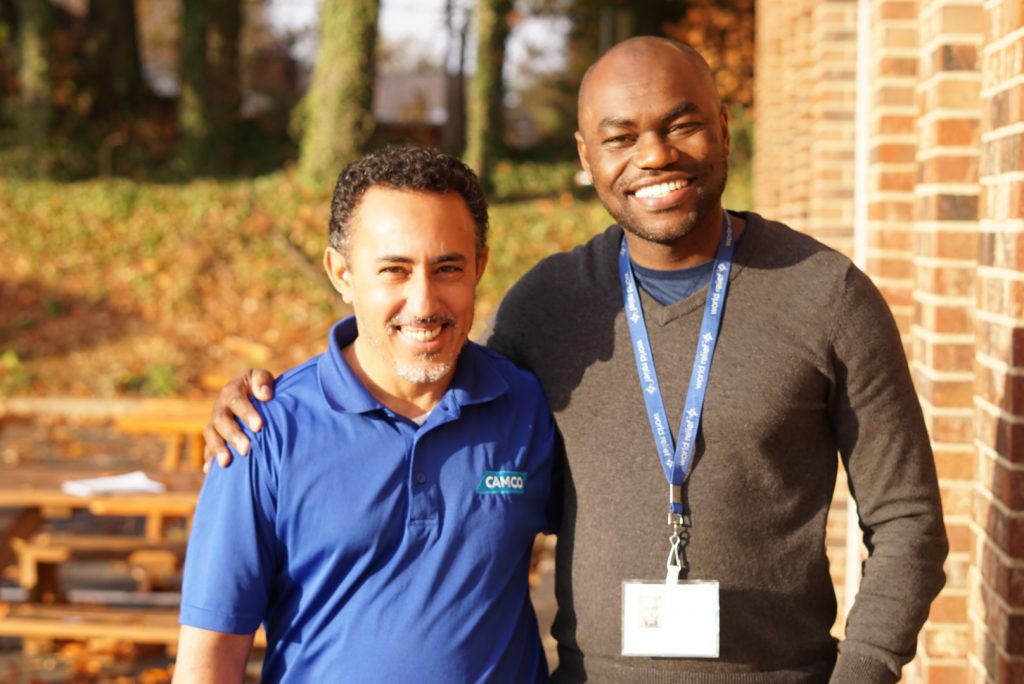
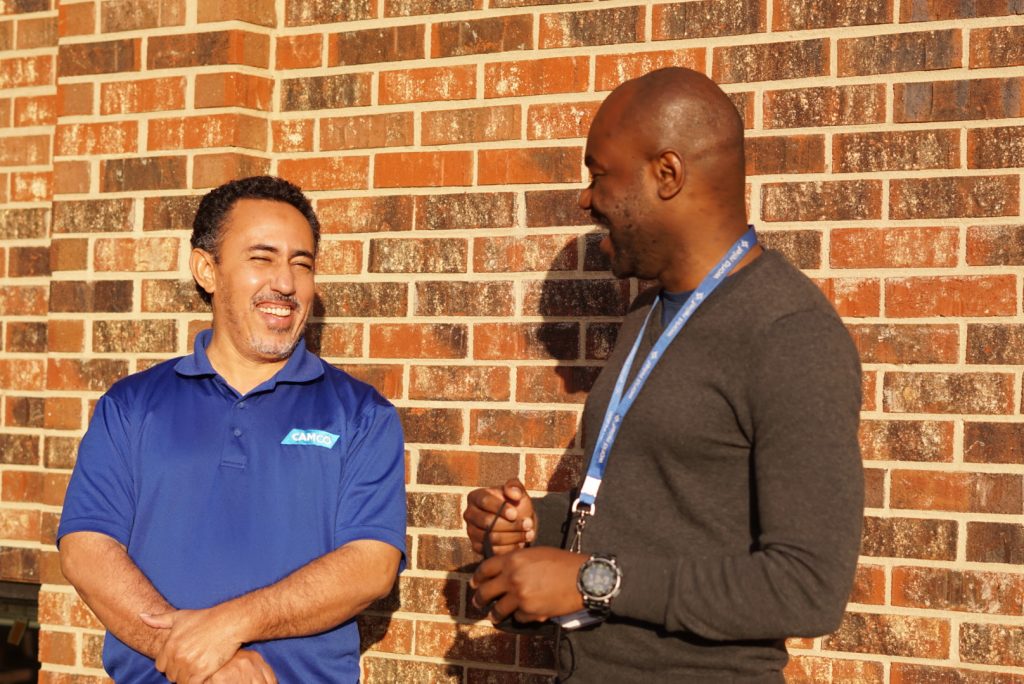
Opportunities That Change Everything
The kindness that Agali says he has been shown stands in contrast to what he experienced in where he came from, Niger.
“Whenever I come to the office at World Relief, everyone is very friendly,” says Agali. “They are genuinely concerned and want to know how I’m doing. It’s incredible to see that in such a busy country, at such a busy time—to have people call me and check in on how I’m doing. I wish there were another word for thank you.”
Reflecting on why he applied for an SIV and decided to leave Niger, Agali mentions the country’s state. While the country is on the brink of civil war, and it might erupt at any time, he says he was diligent in deciding to leave due to his family being a part of a targeted community.
“In my community, we are the minority. My tribe is having a tough time in comparison to other tribes,” he says.
Now, Raphael works directly with Agali as his case manager to help him find a job as soon as possible. Once he can find a job, he will be providing the kind of life he has been wanting to give his five children and wife since arriving. Then the next step is finding a job for his eldest son, who has completed school and has specialized training. Beyond that, Agali says he is ready to work as soon as possible to begin giving back.
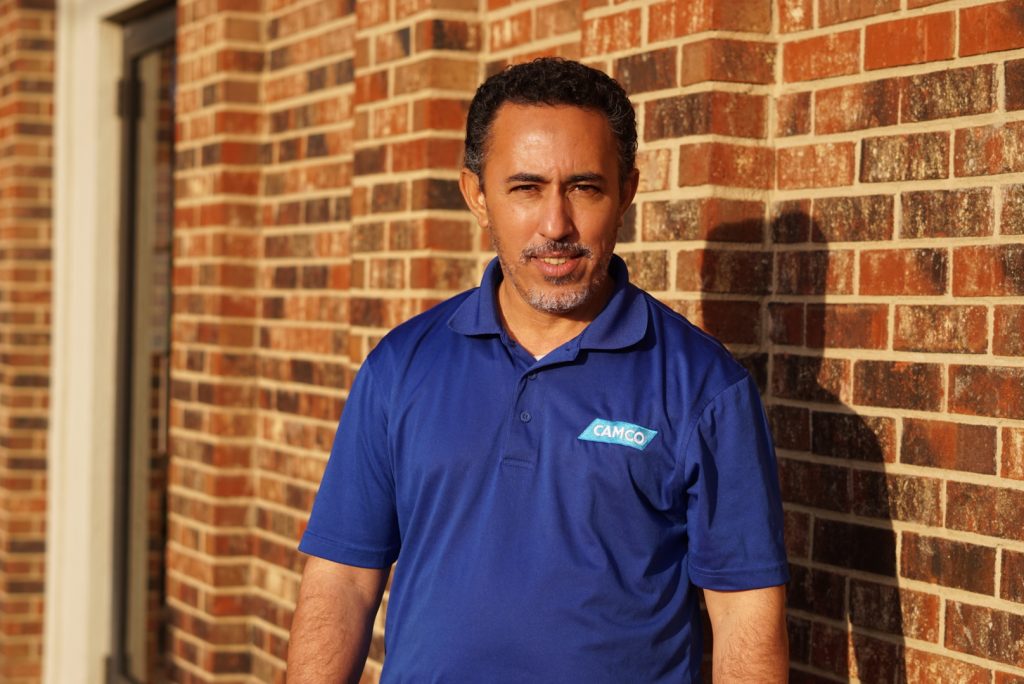
“It is because of World Relief that I’ve been able to start to understand life,” Agali says. “I do not have words for how incredible and kind the World Relief team has been to me. The only way I know how to show my gratitude is through giving back. I don’t know how yet, but one day, that’s what I hope to do.”
Agali uses the gratitude in his heart toward World Relief to motivate him to get a job as soon as possible so he can give back sooner. He already has in many ways. Will you be like Agali and give back while you still can?
Join us in preparing to resettle the hundreds of refugees that will be making their way to our community soon. With your gift, you will be able to see how generosity directly affects the livelihood of others.
Don’t wait for their arrival; prepare to welcome them with a gift today.
Benjamin Marsh: A plea for the Dreamers
As a pastor to a community of immigrants, Benjamin Marsh is very passionate about those who were brought to America as children having a pathway to citizenship. These individuals, termed “Dreamers,” have been shielded and protected by the Deferred Action for Childhood Arrivals (DACA) program. However, the days of DACA are numbered. Now, many fear they will lose the only place they have ever called home.
Marsh points out the facts: many of them served as essential workers during the pandemic, work in education, and other frontline capacities. He also references Galatians 6 to compel evangelical readers to consider why they should not ignore the plight of their neighbors.
Learn and read more about what this local pastor has to say about immigration and advocacy here: Benjamin Marsh: A plea for the Dreamers | Columnists | journalnow.com.
Todd Unzicker and Adam Clark: Christians must heed the call to welcome Afghan refugees and other vulnerable immigrants
By Todd Unzicker and Adam Clark //
Todd Unzicker, executive director-treasure of the Baptist State Convention of North Carolina and Adam Clark, director of World Relief Durham, spoke out about the importance of welcoming incoming Afghan arrivals and others who will resettle in North Carolina within the upcoming weeks and months. “More than 1,000 Afghans will resettle in North Carolina in the coming months after fleeing violence and oppression from the Taliban. When they arrive here, it will be up to North Carolinians to welcome them.
“This presents a challenge, but it is also an opportunity. We can and must answer the call to welcome our vulnerable neighbors from across the world. As Christian leaders, we think a big part of the responsibility for doing so falls to us and our fellow believers, to those of us who call ourselves the body of Christ.”
The Triad prepares to welcome nearly 1200 Afghan evacuees
World Relief Triad is excited to report that we are officially welcoming Afghan arrivals. As one of the many agencies welcoming nearly 1,200 afghan evacuees in the coming months, there are many needs.
Director of the Triad office, Rob Cassell, spoke on our offices’ integration services that will be provided. While there are many resources that have already been provided, the need is still prevalent.
“So, for the community to come around and help us give some direct support. Helping with housing, helping with food, helping with medical support is very important,” Cassell said.
Learn more about how you can respond here, and watch this piece to hear about World Relief Triad’s position as a partner to the community in welcoming their new neighbors.









